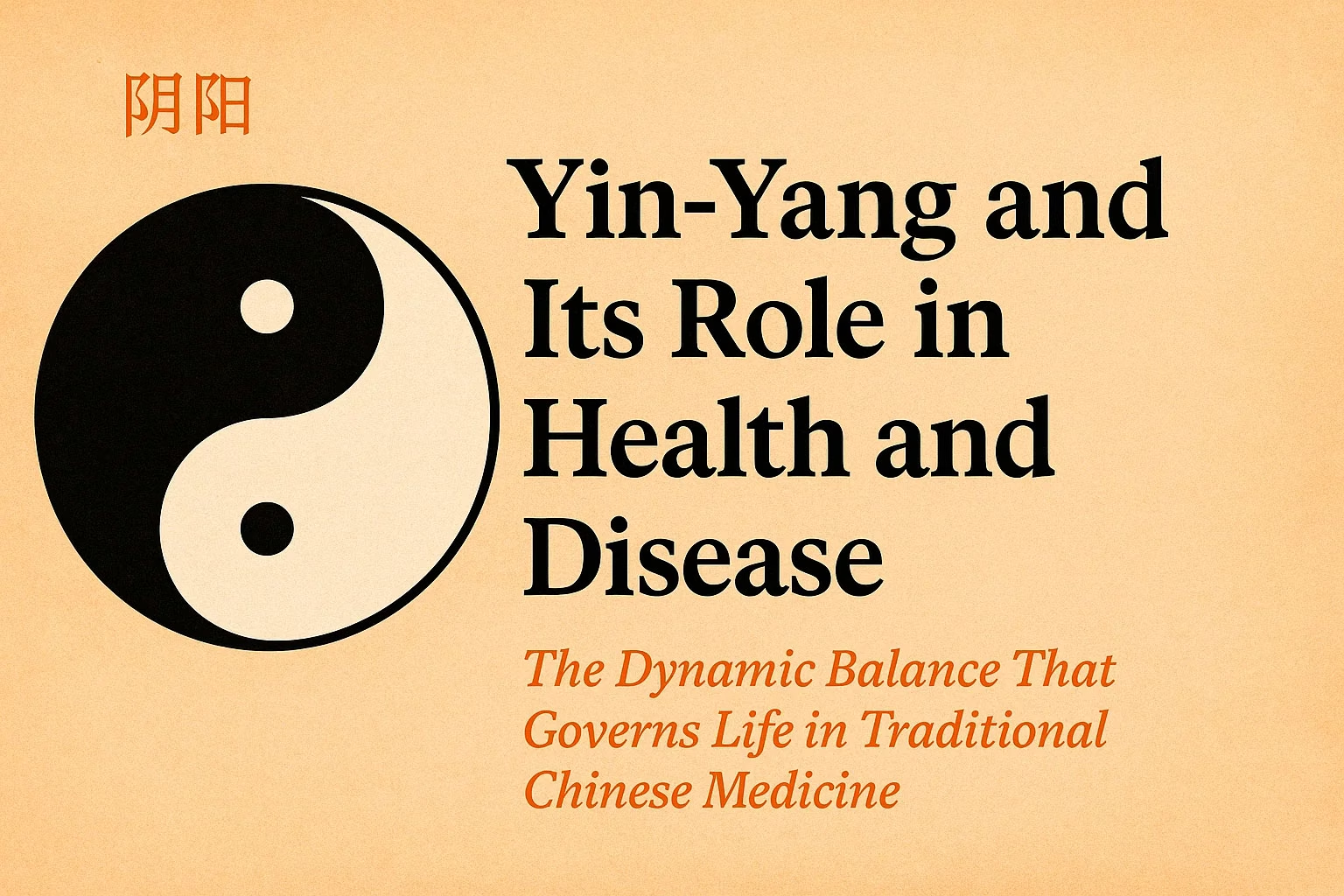The principle of Yin-Yang (阴阳) is one of the most fundamental concepts in Traditional Chinese Medicine (TCM). It represents the dynamic balance between two opposing, yet complementary forces that govern all phenomena in the universe — including the human body.
In TCM, health is achieved through the balance of Yin and Yang, and disease arises when one of these forces becomes excessive or deficient. This article explores how Yin and Yang function in the body, their role in health and disease, and how this ancient concept continues to guide modern medical practice.
🔶 What Are Yin and Yang?
- Yin (阴) represents the cool, passive, material, and feminine aspects of life.
- Yang (阳) represents the hot, active, immaterial, and masculine aspects of life.
Yin and Yang are interdependent, meaning:
- Yin cannot exist without Yang and vice versa.
- They are constantly transforming into each other, creating a dynamic equilibrium.
🔸 Examples of Yin and Yang in the body:
| Yin (阴) | Yang (阳) |
|---|---|
| Night | Day |
| Cold | Heat |
| Water | Fire |
| Moon | Sun |
| Inactivity | Activity |
This constant interplay is at the core of maintaining balance in health and disease.
🔶 The Role of Yin-Yang in TCM Health
In TCM, health is defined as the harmonious balance between Yin and Yang within the body. This balance affects:
- Qi (vital energy)
- Blood (Xue)
- Body fluids (Jin Ye)
The Five Elements and meridian systems also play roles in Yin-Yang balance, creating a complex web of interactions.
🧘♀️ Balance of Yin and Yang Maintains Harmony
- Yin: Nourishes and cools the body, supports rest and rejuvenation.
- Yang: Energizes, activates, and warms the body, supports activity and metabolism.
When Yin is strong, it cools, moistens, and nourishes the body. When Yang is strong, it warms, stimulates, and provides movement.
🔶 Yin-Yang Imbalance and Disease
Illness occurs when there is an excess or deficiency in one of the forces. These imbalances manifest in the body’s symptoms, behaviors, and physiology. Examples include:
1. Yin Deficiency
- Symptoms: Dryness, hot flashes, night sweats, insomnia, anxiety
- Common causes: Chronic illness, overwork, emotional stress
- TCM Treatment: Nourish Yin, clear internal Heat (e.g., Bai He Guo for Lung Yin deficiency)
2. Yang Deficiency
- Symptoms: Cold extremities, fatigue, low libido, pale complexion, frequent urination
- Common causes: Chronic conditions, over-exertion, aging
- TCM Treatment: Warm Yang, tonify Qi and Blood (e.g., Ren Shen for Spleen Yang deficiency)
3. Excess Yin
- Symptoms: Edema, heaviness, excessive sleep, pale and moist skin
- Common causes: Overconsumption of cold/raw foods, damp environments
- TCM Treatment: Resolve Dampness, warm the Spleen (e.g., Yi Yi Ren for damp accumulation)
4. Excess Yang
- Symptoms: Inflammation, redness, irritability, headaches, high blood pressure
- Common causes: Emotional stress, diet, Heat accumulation
- TCM Treatment: Clear Heat, cool the blood (e.g., Long Dan Xie Gan Tang for Liver Fire)
🔶 Yin-Yang Balance in Daily Life: Tips for Maintaining Health
✅ 1. Diet and Nutrition
- Yin-tonifying foods: Pears, lotus seeds, sesame, cucumbers, dairy (in moderation)
- Yang-boosting foods: Spices (ginger, garlic), lamb, chicken, root vegetables
✅ 2. Rest and Activity
- Yin time: Evening (from 9 PM onwards) is when the body restores its Yin through sleep.
- Yang time: Morning hours are best for activity, exercise, and starting your day.
✅ 3. Emotional Balance
- Excessive emotions (stress, anger, sadness) disrupt the balance of Yin and Yang.
- Calm practices like meditation, Qigong, Tai Chi, and deep breathing help to regulate the flow of Qi and restore harmony.
🔶 Conclusion
The principle of Yin-Yang lies at the heart of TCM, offering a timeless framework for understanding the balance of forces that govern health and disease. By learning to recognize the signs of imbalance and apply appropriate lifestyle, dietary, and herbal treatments, we can cultivate wellness, restore harmony, and maintain vitality.
Ultimately, Yin-Yang is not a static concept — it is a dynamic force that shapes every aspect of our physical, mental, and emotional well-being.


发表回复